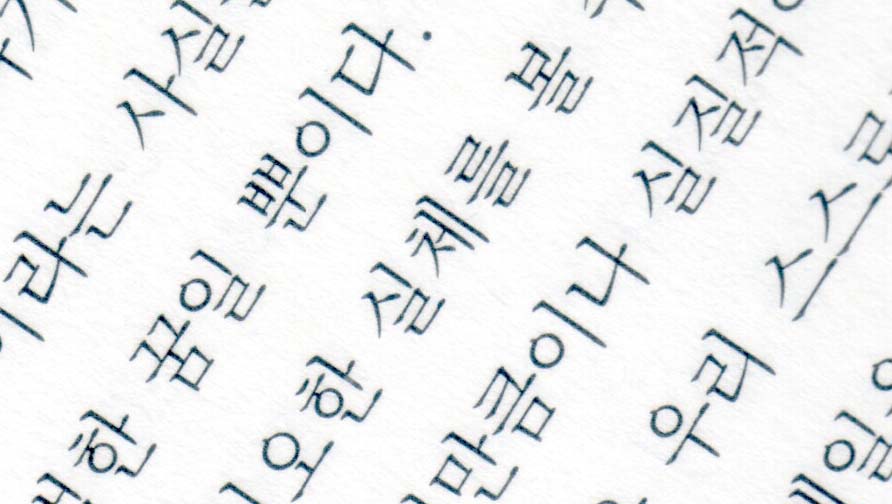I’m working on a new travel guide (A Day by Day guide for Seoul for Frommer’s) and thinking about essential Korean phrases and pronunciation of Korean for English (and other, non-native) speakers. Then, I remembered that I had recorded a short pronunciation guide for the SF Weekly a couple of months ago.
The challenge of approximating Korean words with the English alphabet, is that some of the sounds don’t exist in English and there is no standardization for spelling (Even the Korean government and tourist bureaus change the spelling of city names, etc., every few years making it even more difficult for writers like me to keep it straight.)
I try to spell words as close to the way it sounds in English when pronounced while keeping the Korean government’s usage (so that maps and signs make a bit of sense).
Here is a guide to pronouncing the alphabet (which is a syllabary and generally regular) from my South Korea travel guide:
THE CONSONANTS
„ѱ A cross between “g” and “k,” pronounced like in the word “go,” now spelled with the letter “g” (old spelling was “k”)
„Ñ? A double consonant, the sound of a hard “g” or “k” as in the Spanish “queso,” spelled “kk”
„Ñ¥ Pronounced the same as “n,” and spelled with an “n”
„Ñ? A cross between “d” and “t,” as in “dark,” spelled with a “d” (old spelling: “t”)
„Ñ? A double consonant, the sound of a hard “d/t” as in the Spanish word “t??o” or the “t” in “study,” spelled with “dd”
„Ñ? A cross between “r” and “l,” similar to the Spanish “gracias,” spelled with an “l” or “r”
„ÖÅ Pronounced like the letter “m”
„ÖÇ A cross between the letters “b” and “p,” as in “Busan” or the “b” in “boar,” now spelled with the letter “b” (old spelling “p”)
„ÖÉ A double consonant, the sound of a hard “b” or “p” as in the Spanish “Pepe,” spelled “bb”
„ÖÖ Similar to the letter “s”
„ÖÜ A double consonant, the sound of a hard “s” as in the word “sour,” spelled with “ss”
„Öá When used in the beginning of a syllable, it allows the vowel to be sounded without a hard consonant sound. At the end of a syllable, it sounds like “ng,” as in the end of the word “song”
„Öà Pronounced like the letter “j” in “jazz” (old spelling “ch”).
„Öâ A double consonant, the sound of a hard “j,” I spelled in this book with “jj”
„Öä Pronounced like “ch” in “choice”
„Öã Pronounced like “k”
„Öå Pronounced like “t”
„Öç Pronounced like “p”
„Öé Pronounced like “h”
THE VOWELS
„Öè Pronounced like “ah,” as in “spa”
„Öë Pronounced “ya”
„Öì Pronounced “uh,” as in “umbrella,” spelled “eo”
„Öï Pronounced “yuh,” as in “yum,” spelled “yeo”
„Öó Pronounced “oh,” as in “rope”
„Öõ Pronounced “yo”
„Öú Pronounced “ooh,” as in “stew,” often spelled “u” or sometimes “oo”
„Ö† Pronounced “yu,” as in “you,” spelled “yu” or “yoo”
„Ö° Pronounced “eu,” as in “good” or “hood”
„Ö£ Pronounced “ee,” as in “see”
„Öî A combination vowel pronounced “eh”
„Öê A combination vowel pronounced “ye,” as in “yes”
„Öò A combination vowel pronounced “wa”
„Öû A combination vowel pronounced “whe,” as in “sweat”
„Öù A combination vowel pronounced “wuh,” as in “was”
„Öü A combination vowel pronounced “wee”
„Ö¢ A combination vowel pronounced “eui” (but said quickly)
So, I’m putting in phrases and words in my new travel guide, are there any that you’d like to see? Let me know and I’ll add them to the book. Thanks!

I could use this in LA!
One of the questions I have a hard time with at the markets: “Is this hot/spicy?” “I like spicy/hot.”
Other words would be helpful too, like “salty” etc.
Also, “How do you cook this?”
I love shopping at our local market but the deli clerk doesn’t speak any English.
this is a great pronunciation guide! i am a military spouse living in South Korea with my husband and i am going to share this link with the other mil. spouses who are afraid to try to learn korean. i tell them how easy the alphabet is to learn and how much a difference it can make if you can at least READ korean, even if you can’t speak it.
i have one observation – i’ve noticed that the ‘s’ sound, the single chevron, is often promounced as a ‘t’ sound when found at the end of a syllable, but this is never mentioned in any pronunciation guides i see for foreigners. i think it would be useful if you updated your guide to reflect this aberration of pronunciation.
thanks!
Hi Maggie,
Yes, Korean is really easy to learn how to pronounce (even if you don’t know how to read it!). I taught my white husband how to read Korean letters on the airplane.
As for the „ÖÖ at the end of a syllable, you’re right about the “t” sound. I’ll put that in my next book. There are also a couple of other irregularities, but just a few. I’ll see if I can remember them and put them in the pronunciation guide (I can’t think of it right now — writer’s brain. Can’t think.)
Thanks for the suggestions and I hope it is helpful for all the military and the spouses over in Korea.
Cecilia
Hi Gail,
I esp. like “Is this spicy?” I think that’ll be really useful for people to know how to say (whether or not you like spicy food). In Korean, it would be “Ïù¥Í?ÉÏùÄ ÎߧÏõåÏöî?” pronounced: I-geosseun maewuh-yo?
“How do I cook this?” would be helpful for those shopping in grocery stores. It’s a little more complicated to say in Korean. It would be “Ïù¥Í±¥ Ïñ¥ÎñªÍ?å Ïöîζ¨Ìï¥ÏÑú ή?Îäî ͱ?ÏóêÏöî?” Pronunciation: I-geon uhdduhgeh yolihaesuh mugneun guh-eyo? Which translates more like: “How do I cook and eat this?”
Hope this helps you navigate the Korean stores and restaurants even in America.
Thanks!
Cecilia